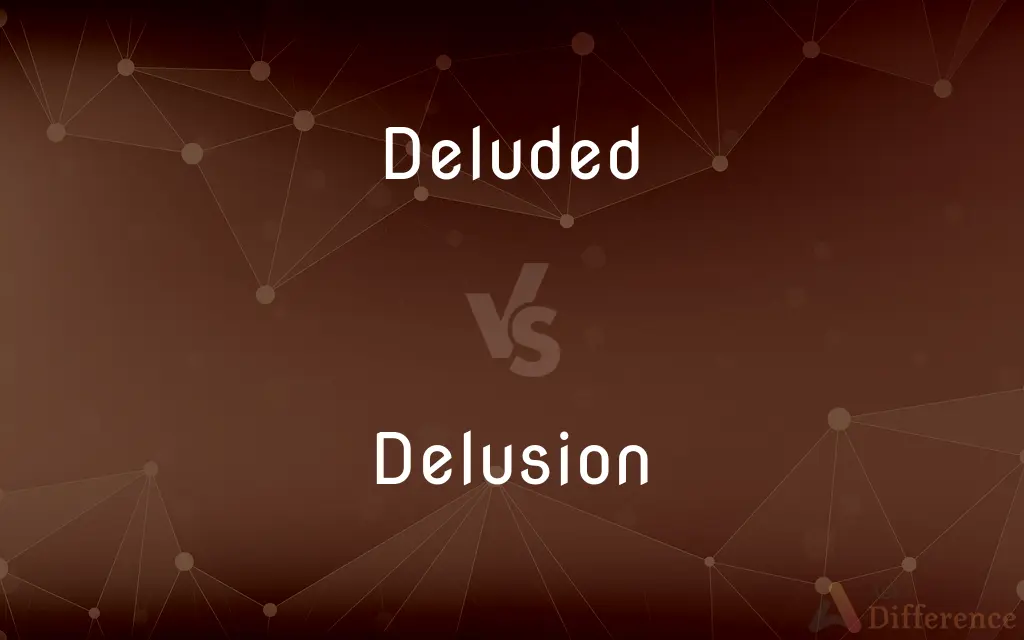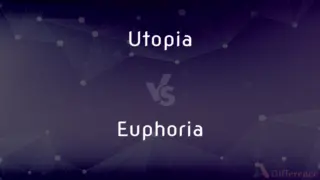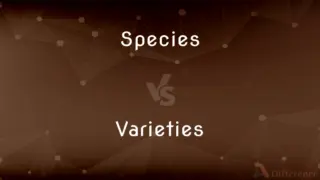Deluded vs. Delusion — What's the Difference?
By Tayyaba Rehman & Fiza Rafique — Updated on March 26, 2024
Deluded refers to being misled or deceived into believing something false, while delusion is a firm belief despite being contradicted by reality or rational argument.

Difference Between Deluded and Delusion
Table of Contents
ADVERTISEMENT
Key Differences
Deluded involves a state of being misled or having mistaken beliefs, often due to external influences or misinformation. Whereas, a delusion is a fixed, false belief that is resistant to reasoning or confrontation with actual facts. It's more of an internal conviction, often associated with psychiatric conditions.
A person becomes deluded when influenced by deceptive reasoning or lies, suggesting an external source plays a role. On the other hand, delusions originate within the individual, hinting at psychological or neurological conditions that distort their perception of reality.
Deluded can describe a temporary condition or reaction to a particular situation, indicating a changeable state. Delusions are typically persistent and may not easily dissipate even when evidence is presented, suggesting a deeper cognitive issue.
In the context of mental health, being deluded might not indicate a clinical diagnosis, but rather a temporary state of confusion or misunderstanding. Delusion, however, is a term often used in diagnostic criteria to describe a symptom of serious mental health disorders such as schizophrenia.
The process of becoming deluded can often be reversed through information, education, or an alteration in circumstances. Delusions, due to their nature, usually require professional psychiatric intervention for resolution, reflecting their complexity and resilience.
ADVERTISEMENT
Comparison Chart
Definition
The state of being misled or deceived.
A fixed, false belief resistant to reason.
Origin
External influence or misinformation.
Internal, psychological condition.
Duration
Can be temporary or situation-specific.
Often persistent, regardless of evidence.
Relation to Mental Health
Might not indicate a clinical diagnosis.
Symptom of serious mental health disorders.
Resolution
Reversed through information or education.
Requires professional psychiatric treatment.
Compare with Definitions
Deluded
Holding onto beliefs in spite of contrary evidence.
She was deluded about her chances of winning.
Delusion
A belief that is clearly unrealistic.
Her delusion of grandeur made her believe she would be a famous star overnight.
Deluded
Believing in something untrue because of deception.
He was deluded into thinking he could trust them.
Delusion
A belief held with strong conviction despite superior evidence to the contrary.
The idea of the earth being flat is a delusion.
Deluded
Affected by illusions.
The desert travelers were deluded by visions of water.
Delusion
A symptom of psychological disorders.
Hearing voices is a common delusion among those with schizophrenia.
Deluded
Misled by false promises or beliefs.
The investors were deluded by the startup's exaggerated claims.
Delusion
A false personal belief not subject to reason.
His belief in his ability to fly was a dangerous delusion.
Deluded
Confused or deceived.
Deluded by his own optimism, he underestimated the challenges.
Delusion
A misconception resulting from a misinterpretation of reality.
The mirage was nothing but a visual delusion.
Deluded
To cause to hold a false belief; deceive thoroughly
Unscrupulous brokers who deluded their clients about the underlying value of the stocks they were touting.
Delusion
A delusion is a fixed belief that is not amenable to change in light of conflicting evidence. As a pathology, it is distinct from a belief based on false or incomplete information, confabulation, dogma, illusion, or some other misleading effects of perception as individuals with these beliefs are able to change or readjust their beliefs upon viewing the evidence for these beliefs.
Deluded
(Obsolete) To elude or evade.
Delusion
An idiosyncratic belief or impression maintained despite being contradicted by reality or rational argument, typically as a symptom of mental disorder
The delusion of being watched
Deluded
(Obsolete) To frustrate the hopes or plans of.
Delusion
The act or process of deluding.
Deluded
Being affected by delusions.
He was deluded to think that she cared in the slightest.
Delusion
The state of being deluded.
Deluded
Simple past tense and past participle of delude
Delusion
A false belief or opinion
Labored under the delusion that success was at hand.
Delusion
(Psychiatry) A false belief or perception that is a manifestation of a mental illness
Delusions of persecution.
Delusion
A false belief that is resistant to confrontation with actual facts.
Delusion
The state of being deluded or misled, or process of deluding somebody.
It is far better to grasp the universe as it really is than to persist in delusion, however satisfying and reassuring.
Delusion
That which is falsely or delusively believed or propagated; false belief; error in belief.
Delusion
A fixed, false belief, that will not change, despite evidence to the contrary.
Delusion
The act of deluding; deception; a misleading of the mind.
Delusion
The state of being deluded or misled.
Delusion
That which is falsely or delusively believed or propagated; false belief; error in belief.
And fondly mourned the dear delusion gone.
Delusion
(psychology) an erroneous belief that is held in the face of evidence to the contrary
Delusion
A mistaken or unfounded opinion or idea;
He has delusions of competence
His dreams of vast wealth are a hallucination
Delusion
The act of deluding; deception by creating illusory ideas
Common Curiosities
Is being deluded always a bad thing?
While generally viewed negatively due to the misconception, in some contexts, being deluded might shield one from harsh realities temporarily.
Are delusions treatable?
With appropriate psychiatric intervention, many delusions can be managed or treated.
How can one tell if someone has a delusion?
A delusion is characterized by a firm belief in something false, despite evidence to the contrary, often noticed through irrational behavior or statements.
What causes a person to become deluded?
Being deluded often results from external misinformation or deceit.
Can a deluded belief become a delusion?
If a false belief becomes deeply entrenched and resistant to reason, it can evolve into a delusion.
Are all delusions harmful?
Not all delusions have negative outcomes; some may be benign or have minimal impact on daily functioning.
Can external events trigger delusions?
External factors can exacerbate or influence the formation of delusions, especially in predisposed individuals.
Is delusion a conscious choice?
Delusions are not a matter of choice; they are involuntary beliefs.
Can children have delusions?
Children can experience delusions, often related to developmental stages or psychiatric conditions.
Can a delusion be a symptom of mental illness?
Yes, delusions are often symptoms of psychiatric conditions like schizophrenia.
Do delusions affect intelligence?
Delusions do not directly relate to intelligence; they are more about how one perceives reality.
How does one support someone with delusions?
Offering empathy, seeking professional help, and avoiding confrontational challenges to their beliefs are important support strategies.
What role does evidence play in dispelling delusions?
While evidence is critical in challenging delusions, its effectiveness varies greatly due to the nature of the delusion.
Can delusions ever be beneficial?
In rare cases, delusions may provide psychological comfort or a coping mechanism for dealing with trauma or stress.
How does culture affect delusions?
Cultural beliefs and norms can shape the content of delusions, making them more understandable or acceptable within specific contexts.
Share Your Discovery

Previous Comparison
Utopia vs. Euphoria
Next Comparison
Species vs. VarietiesAuthor Spotlight
Written by
Tayyaba RehmanTayyaba Rehman is a distinguished writer, currently serving as a primary contributor to askdifference.com. As a researcher in semantics and etymology, Tayyaba's passion for the complexity of languages and their distinctions has found a perfect home on the platform. Tayyaba delves into the intricacies of language, distinguishing between commonly confused words and phrases, thereby providing clarity for readers worldwide.
Co-written by
Fiza RafiqueFiza Rafique is a skilled content writer at AskDifference.com, where she meticulously refines and enhances written pieces. Drawing from her vast editorial expertise, Fiza ensures clarity, accuracy, and precision in every article. Passionate about language, she continually seeks to elevate the quality of content for readers worldwide.
















































